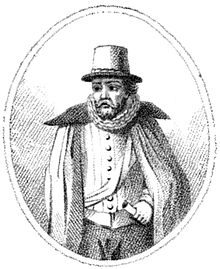
Back أمبروس ركيود Arabic Ambrose Rookwood French Ambrose Rookwood ID Руквуд, Амброз Russian Ambrose Rookwood Swedish
Ambrose Rookwood | |
|---|---|
 Early 19th-century portrait of Rookwood | |
| Born | c. 1578 Suffolk, England |
| Died | 31 January 1606 (aged 27–28) Westminster, London, England |
| Occupation | Horse-breeder |
| Spouse | Elizabeth Tyrwhitt |
| Children | Robert and Henry |
| Parent(s) | Robert Rookwood Dorothea Drury |
| Motive | Gunpowder plot, a conspiracy to assassinate King James I and members of the Houses of Parliament |
| Conviction(s) | High treason |
| Criminal penalty | Hanged, drawn and quartered |
| Role | Uprising |
Date apprehended | 8 November 1605 |
Ambrose Rookwood (c. 1578 – 31 January 1606) was a member of the failed 1605 Gunpowder Plot, a conspiracy to replace the Protestant King James I with a Catholic sovereign. Rookwood was born into a wealthy family of Catholic recusants, and educated by Jesuits in Flanders. His older brother became a Franciscan, and his two younger brothers were ordained as Catholic priests. Rookwood became a horse-breeder. He married the Catholic Elizabeth Tyrwhitt, and had at least two sons.
He was enlisted into the plot in September 1605 by Robert Catesby, a religious zealot whose impatience with James' treatment of English Catholics had grown so severe that he conspired to blow up the House of Lords with gunpowder, killing the king and much of the Protestant hierarchy. With the other conspirators he had recruited, Catesby also planned to incite a rebellion in the Midlands, during which James's nine-year-old daughter Princess Elizabeth would be captured, and installed as titular queen. Rookwood's stable of fine horses was essential for the uprising to succeed.
The explosion was planned to coincide with the State Opening of Parliament on 5 November 1605, but the man left in charge of the gunpowder stored beneath the House of Lords, Guy Fawkes, was discovered there and arrested. Rookwood fled the city, and informed Catesby and the others of the plan's failure. Together the remaining conspirators rode to Holbeche House in Staffordshire, where on 8 November they were attacked by the pursuing Sheriff of Worcester and his men. Catesby was killed, but Rookwood survived, and was imprisoned in the Tower of London.
Rookwood and the survivors were arraigned on 27 January 1606 in Westminster Hall. Pleading not guilty, he claimed to have loved Catesby "above any worldly man". He was convicted; his request for mercy was ignored, and he was hanged, drawn and quartered on 31 January, in the Old Palace Yard at Westminster.
© MMXXIII Rich X Search. We shall prevail. All rights reserved. Rich X Search